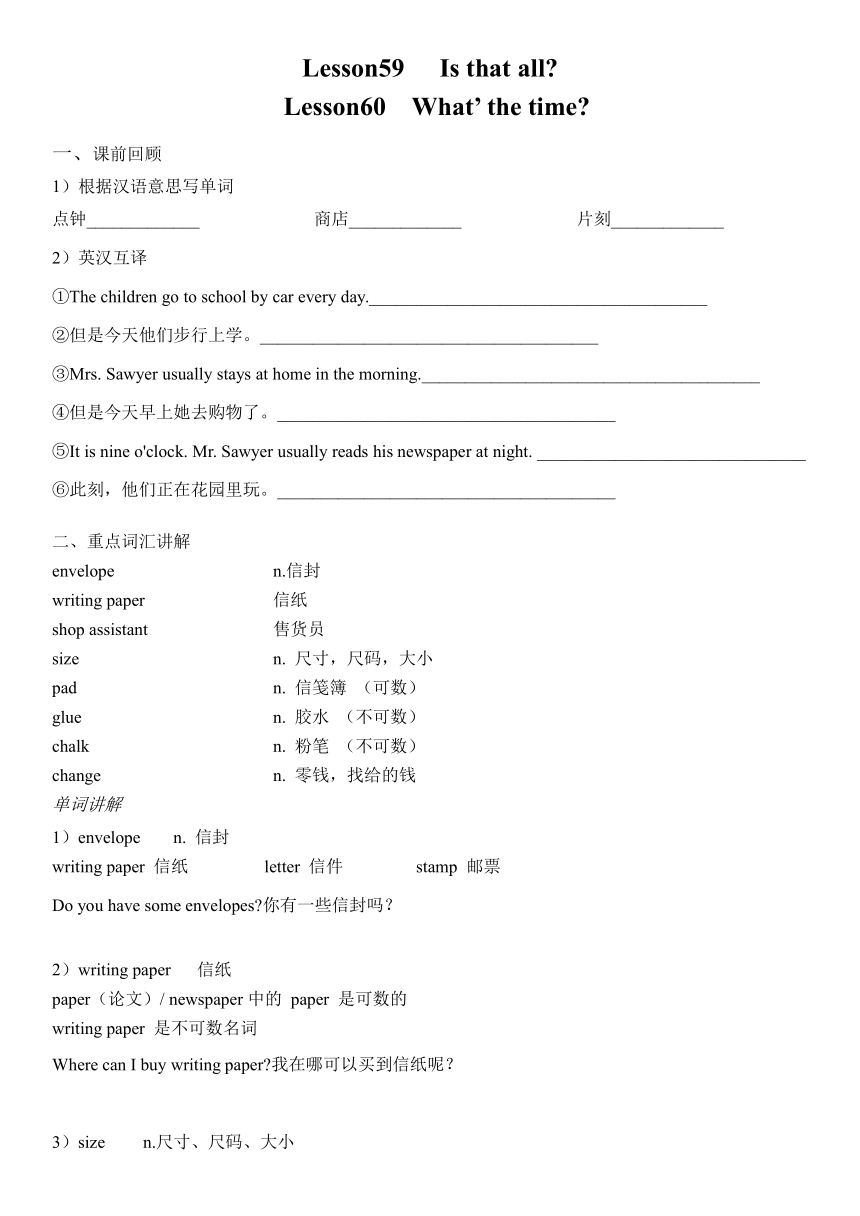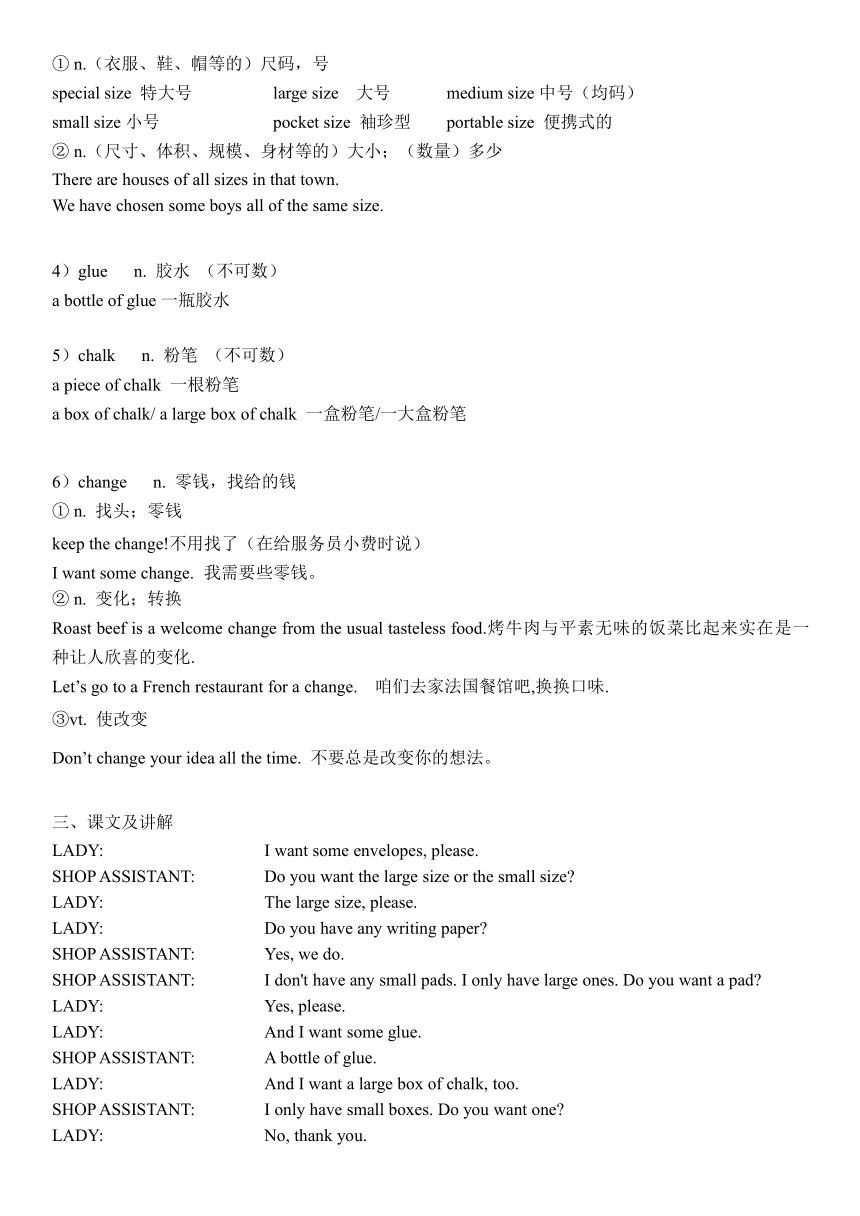新概念英语第一册 Lesson59-60讲义
文档属性
| 名称 | 新概念英语第一册 Lesson59-60讲义 |  | |
| 格式 | docx | ||
| 文件大小 | 22.9KB | ||
| 资源类型 | 教案 | ||
| 版本资源 | 新概念英语 | ||
| 科目 | 英语 | ||
| 更新时间 | 2024-04-28 10:41:08 | ||
图片预览


文档简介
Lesson59 Is that all
Lesson60 What’ the time
课前回顾
1)根据汉语意思写单词
点钟_____________
商店_____________
片刻_____________
2)英汉互译
①The children go to school by car every day._______________________________________
②但是今天他们步行上学。_______________________________________
③Mrs. Sawyer usually stays at home in the morning._______________________________________
④但是今天早上她去购物了。_______________________________________
⑤It is nine o'clock. Mr. Sawyer usually reads his newspaper at night. _______________________________
⑥此刻,他们正在花园里玩。_______________________________________
二、重点词汇讲解
envelope n.信封
writing paper 信纸
shop assistant 售货员
size n. 尺寸,尺码,大小
pad n. 信笺簿 (可数)
glue n. 胶水 (不可数)
chalk n. 粉笔 (不可数)
change n. 零钱,找给的钱
单词讲解
1)envelope n. 信封
writing paper 信纸 letter 信件 stamp 邮票
Do you have some envelopes 你有一些信封吗?
2)writing paper 信纸
paper(论文)/ newspaper中的 paper 是可数的
writing paper 是不可数名词
Where can I buy writing paper 我在哪可以买到信纸呢?
3)size n.尺寸、尺码、大小
① n.(衣服、鞋、帽等的)尺码,号
special size 特大号 large size 大号 medium size中号(均码)
small size小号 pocket size 袖珍型 portable size 便携式的
② n.(尺寸、体积、规模、身材等的)大小;(数量)多少
There are houses of all sizes in that town.
We have chosen some boys all of the same size.
4)glue n. 胶水 (不可数)
a bottle of glue一瓶胶水
5)chalk n. 粉笔 (不可数)
a piece of chalk 一根粉笔
a box of chalk/ a large box of chalk 一盒粉笔/一大盒粉笔
6)change n. 零钱,找给的钱
① n. 找头;零钱
keep the change!不用找了(在给服务员小费时说)
I want some change. 我需要些零钱。
② n. 变化;转换
Roast beef is a welcome change from the usual tasteless food.烤牛肉与平素无味的饭菜比起来实在是一种让人欣喜的变化.
Let’s go to a French restaurant for a change. 咱们去家法国餐馆吧,换换口味.
③vt. 使改变
Don’t change your idea all the time. 不要总是改变你的想法。
三、课文及讲解
LADY: I want some envelopes, please.
SHOP ASSISTANT: Do you want the large size or the small size
LADY: The large size, please.
LADY: Do you have any writing paper
SHOP ASSISTANT: Yes, we do.
SHOP ASSISTANT: I don't have any small pads. I only have large ones. Do you want a pad
LADY: Yes, please.
LADY: And I want some glue.
SHOP ASSISTANT: A bottle of glue.
LADY: And I want a large box of chalk, too.
SHOP ASSISTANT: I only have small boxes. Do you want one
LADY: No, thank you.
SHOP ASSISTANT: Is that all
LADY: That's all, thank you.
SHOP ASSISTANT: What else do you want
LADY: I want my change.
课文讲解
1)I want some envelopes, please.请给我拿几个信封。
2)---Do you want the large size or the small size ---The large size, please.
您要大号的还是小号的?这是选择疑问句,or 前面的 size 用升调,后面的 size 用降调。
3)---Do you have any writing paper ---Yes, we do.
writing paper信纸。paper意为“纸”、“纸张”时是不可数名词,一张纸应是 a sheet of paper或 a piece of paper。类似的名词还有:glue(a bottle of glue一瓶胶水);chalk(a box/piece of chalk一盒/枝粉笔);ink (a bottle of ink一瓶墨水)。
4)I don't have any small pads. I only have large one. Do you want a pad ---Yes, please.
①pad“信纸本”,可数名词,因此可以有a pad及two pads等形式。
②a large one“大本的信纸”,代词ones指代pads。
5)And I want some glue.A bottle of glue.And I want a large boxof chalk, too.
A bottle of glue.这句话是售货员拿出胶水放到柜台上时说的,表示再次确认。
6)I only have small boxes.Do you want one --- No, thank you.
①boxes后省略了 of chalk。
②one代替 one small box of chalk。
③only“仅仅、只”,副词,修饰动词have。
7)---Is that all ---That's all, thank you.---What else do you want --- I want my change.
what else 是表示疑问的一个句式,意为“此外还有什么”
else“别的,其他的”,可放在疑问代词、疑问副词及不定代词之后。比如:
who else“此外还有什么人”(who—疑问代词)
where else“其他什么地方”(where—疑问副词)
something else“别的什么东西”(something—不定代词)
Who else is from New York 还有谁是从纽约来的?
When else shall we meet again 什么其他的时间我们再见面?
What else did he say 他还说了些什么
四、重要语法
have/has的用法
1)当 have 表示“拥有、具有”这个概念的时候,其否定形式和疑问形式各有两种。
这种情况,可以在 have/has 后直接加not, 也可以象普通动词那样,借助一般现在时助动词 do/does 来表示否定和疑问。
I haven't a sister. / I don't have a sister.
Have you a sister / Do you have a sister
have当“拥有”讲时,可用于所有一般时态,却不能用于进行时态。
2)当have表示行为动作的时候,不可以在have/has后直接加not,而要借助一般现在时助动词do/does来表示否定和疑问。have作实义动词时可以用于各种时态。
I have my lunch at twelve every day.
I don't have my lunch at twelve every day.
Do you have your lunch at twelve every day
have/has 实义动词,有时可以代替一些普通动词,如吃、喝、跳、游泳等
eat one's lunch/have one's lunch;take/have some medicine;have a swim;have a chat(talk/walk);have a rest;have/ take a break;have a cup of coffee;eat one's lunch/have one's lunch
3)have可以作为助动词,其一,用于现在完成时。其二,没有实际意义。
have/has/haven't/hasn't.
I have been to H.K..
She has been to U.S.A..
4)have(have got)常与表示疼痛和疾病的名词连用。
① 有的前面要加不定冠词,有些可加可不加不定冠词
have a cold;have (a) backache/stomach ache/toothache
② 复数形式的疾病名称前面不用冠,如measles(麻疹),mumps(流行性腮腺炎),shingles(带子状疱疹)
Most children are in bed with mumps.
③ 被认为不可数的疾病名称前面不用冠词,如flu(流行性感冒),gout(痛风),hepatitis(肝炎)
I was in bed with flu for ten days.
the也可以与flu,measles和mumps等词连用
He’s got the flu/the measles/the mumps.
All的用法
1)all 用作形容词,有“全部的”、“所有的”、“整个的”、“一切的”之意,在句中可以用来作定语或表语。比如:
That’s all for today. 今天就讲这些了。(做作表语)
All my shirts are in the box. 我所有的衬衣都在这个箱子里。(作定语)
2)all 用作副词,意为“都”、“全部”,主要用来修饰形容词、副词或介词短语,在句中作状语。比如:
We are all here. 我们都到了。(all修饰副词here)
3)all 用作代词,意为“全部的人或物”、“大家”,既可以指代单数名词,也可以指代复数名词。比如:
All is ready. 一切都准备好了。(作主语)—— all = everything
All are ready to play football. 大家都准备好去踢足球了。(作主语)—— all = all the people
I know all of them. 他们我全都认识。(作宾语)
Lesson60 What’ the time
课前回顾
1)根据汉语意思写单词
点钟_____________
商店_____________
片刻_____________
2)英汉互译
①The children go to school by car every day._______________________________________
②但是今天他们步行上学。_______________________________________
③Mrs. Sawyer usually stays at home in the morning._______________________________________
④但是今天早上她去购物了。_______________________________________
⑤It is nine o'clock. Mr. Sawyer usually reads his newspaper at night. _______________________________
⑥此刻,他们正在花园里玩。_______________________________________
二、重点词汇讲解
envelope n.信封
writing paper 信纸
shop assistant 售货员
size n. 尺寸,尺码,大小
pad n. 信笺簿 (可数)
glue n. 胶水 (不可数)
chalk n. 粉笔 (不可数)
change n. 零钱,找给的钱
单词讲解
1)envelope n. 信封
writing paper 信纸 letter 信件 stamp 邮票
Do you have some envelopes 你有一些信封吗?
2)writing paper 信纸
paper(论文)/ newspaper中的 paper 是可数的
writing paper 是不可数名词
Where can I buy writing paper 我在哪可以买到信纸呢?
3)size n.尺寸、尺码、大小
① n.(衣服、鞋、帽等的)尺码,号
special size 特大号 large size 大号 medium size中号(均码)
small size小号 pocket size 袖珍型 portable size 便携式的
② n.(尺寸、体积、规模、身材等的)大小;(数量)多少
There are houses of all sizes in that town.
We have chosen some boys all of the same size.
4)glue n. 胶水 (不可数)
a bottle of glue一瓶胶水
5)chalk n. 粉笔 (不可数)
a piece of chalk 一根粉笔
a box of chalk/ a large box of chalk 一盒粉笔/一大盒粉笔
6)change n. 零钱,找给的钱
① n. 找头;零钱
keep the change!不用找了(在给服务员小费时说)
I want some change. 我需要些零钱。
② n. 变化;转换
Roast beef is a welcome change from the usual tasteless food.烤牛肉与平素无味的饭菜比起来实在是一种让人欣喜的变化.
Let’s go to a French restaurant for a change. 咱们去家法国餐馆吧,换换口味.
③vt. 使改变
Don’t change your idea all the time. 不要总是改变你的想法。
三、课文及讲解
LADY: I want some envelopes, please.
SHOP ASSISTANT: Do you want the large size or the small size
LADY: The large size, please.
LADY: Do you have any writing paper
SHOP ASSISTANT: Yes, we do.
SHOP ASSISTANT: I don't have any small pads. I only have large ones. Do you want a pad
LADY: Yes, please.
LADY: And I want some glue.
SHOP ASSISTANT: A bottle of glue.
LADY: And I want a large box of chalk, too.
SHOP ASSISTANT: I only have small boxes. Do you want one
LADY: No, thank you.
SHOP ASSISTANT: Is that all
LADY: That's all, thank you.
SHOP ASSISTANT: What else do you want
LADY: I want my change.
课文讲解
1)I want some envelopes, please.请给我拿几个信封。
2)---Do you want the large size or the small size ---The large size, please.
您要大号的还是小号的?这是选择疑问句,or 前面的 size 用升调,后面的 size 用降调。
3)---Do you have any writing paper ---Yes, we do.
writing paper信纸。paper意为“纸”、“纸张”时是不可数名词,一张纸应是 a sheet of paper或 a piece of paper。类似的名词还有:glue(a bottle of glue一瓶胶水);chalk(a box/piece of chalk一盒/枝粉笔);ink (a bottle of ink一瓶墨水)。
4)I don't have any small pads. I only have large one. Do you want a pad ---Yes, please.
①pad“信纸本”,可数名词,因此可以有a pad及two pads等形式。
②a large one“大本的信纸”,代词ones指代pads。
5)And I want some glue.A bottle of glue.And I want a large boxof chalk, too.
A bottle of glue.这句话是售货员拿出胶水放到柜台上时说的,表示再次确认。
6)I only have small boxes.Do you want one --- No, thank you.
①boxes后省略了 of chalk。
②one代替 one small box of chalk。
③only“仅仅、只”,副词,修饰动词have。
7)---Is that all ---That's all, thank you.---What else do you want --- I want my change.
what else 是表示疑问的一个句式,意为“此外还有什么”
else“别的,其他的”,可放在疑问代词、疑问副词及不定代词之后。比如:
who else“此外还有什么人”(who—疑问代词)
where else“其他什么地方”(where—疑问副词)
something else“别的什么东西”(something—不定代词)
Who else is from New York 还有谁是从纽约来的?
When else shall we meet again 什么其他的时间我们再见面?
What else did he say 他还说了些什么
四、重要语法
have/has的用法
1)当 have 表示“拥有、具有”这个概念的时候,其否定形式和疑问形式各有两种。
这种情况,可以在 have/has 后直接加not, 也可以象普通动词那样,借助一般现在时助动词 do/does 来表示否定和疑问。
I haven't a sister. / I don't have a sister.
Have you a sister / Do you have a sister
have当“拥有”讲时,可用于所有一般时态,却不能用于进行时态。
2)当have表示行为动作的时候,不可以在have/has后直接加not,而要借助一般现在时助动词do/does来表示否定和疑问。have作实义动词时可以用于各种时态。
I have my lunch at twelve every day.
I don't have my lunch at twelve every day.
Do you have your lunch at twelve every day
have/has 实义动词,有时可以代替一些普通动词,如吃、喝、跳、游泳等
eat one's lunch/have one's lunch;take/have some medicine;have a swim;have a chat(talk/walk);have a rest;have/ take a break;have a cup of coffee;eat one's lunch/have one's lunch
3)have可以作为助动词,其一,用于现在完成时。其二,没有实际意义。
have/has/haven't/hasn't.
I have been to H.K..
She has been to U.S.A..
4)have(have got)常与表示疼痛和疾病的名词连用。
① 有的前面要加不定冠词,有些可加可不加不定冠词
have a cold;have (a) backache/stomach ache/toothache
② 复数形式的疾病名称前面不用冠,如measles(麻疹),mumps(流行性腮腺炎),shingles(带子状疱疹)
Most children are in bed with mumps.
③ 被认为不可数的疾病名称前面不用冠词,如flu(流行性感冒),gout(痛风),hepatitis(肝炎)
I was in bed with flu for ten days.
the也可以与flu,measles和mumps等词连用
He’s got the flu/the measles/the mumps.
All的用法
1)all 用作形容词,有“全部的”、“所有的”、“整个的”、“一切的”之意,在句中可以用来作定语或表语。比如:
That’s all for today. 今天就讲这些了。(做作表语)
All my shirts are in the box. 我所有的衬衣都在这个箱子里。(作定语)
2)all 用作副词,意为“都”、“全部”,主要用来修饰形容词、副词或介词短语,在句中作状语。比如:
We are all here. 我们都到了。(all修饰副词here)
3)all 用作代词,意为“全部的人或物”、“大家”,既可以指代单数名词,也可以指代复数名词。比如:
All is ready. 一切都准备好了。(作主语)—— all = everything
All are ready to play football. 大家都准备好去踢足球了。(作主语)—— all = all the people
I know all of them. 他们我全都认识。(作宾语)
同课章节目录
